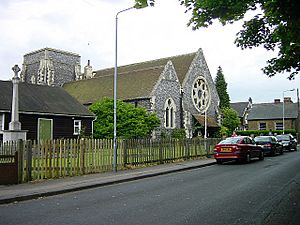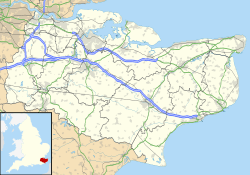Church of All Saints, Murston facts for kids
Quick facts for kids All Saints |
|
|---|---|
| Church of All Saints | |

All Saints
|
|
| 51°20′33″N 0°45′11″E / 51.34245°N 0.75310°E | |
| Location | Murston, Kent |
| Country | England |
| Denomination | Anglican |
| History | |
| Founded | 1872–3 |
| Consecrated | 1874 |
| Architecture | |
| Heritage designation | Listed building – Grade II |
| Architect(s) | William Burges |
| Architectural type | Gothic Revival |
| Style | Early English |
The Church of All Saints is a special church located in Murston, a village near Sittingbourne in Kent, England. It is a Church of England parish church. This church is famous because of its architect, William Burges, who designed it between 1873 and 1874.
The church was built in an "early Gothic Style," which means it looks like old churches from the Middle Ages. It even uses parts from a much older church that stood there before, from the 1100s! Since 1974, it has been a Grade II listed building. This means it's an important historical building that needs to be protected.
Contents
History of All Saints Church
Building the First Church
The very first All Saints church was built a long, long time ago, in 1291. It stood for many centuries.
Moving the Church for Better Air
Later, during the Industrial Revolution, many factories like brickworks and gasworks were built near the church. The smoke and fumes from these factories made it hard for people to breathe inside the church during services.
So, the church's leader, called the rector, decided to build a new church. He even paid £500 of his own money for it. This new church would be built away from the smoky industrial area. The old medieval church was mostly taken down. However, some of its materials were saved and used again in the new All Saints church. A part of the old church's chancel (the area around the altar) was left standing. It was used as a special building for the graveyard.
Designing the New Church
The famous architect William Burges designed the new church. It cost a total of £3,000 to build. There were plans to include a tall tower in the new church, which would have cost another £3,000. However, people only donated £2,000, so the tower had to be made shorter than planned.
Consecration and Use
The foundation stone for the new church was laid with the Bishop of Dover present. When the church was finished, the Archbishop of Canterbury officially dedicated it in 1874. The old churchyard continued to be used for burials until 1922. After that, the Bishop of Dover blessed the new church's churchyard for burials.
In 1974, the church was given Grade II listed status. This means it is recognized as a building of special historical interest. More recently, in 2022, some old medieval drawings and writings were found again on the church's pillars. These pillars had been moved from the original old church.
Modern Use of the Church
Today, the Church of All Saints is home to the Murston Community Bank. This is a project started by the Diocese of Canterbury and the Kent Savers Credit Union. It opened in 2014 to help people in the community. Regular Church services are not held at All Saints anymore.


